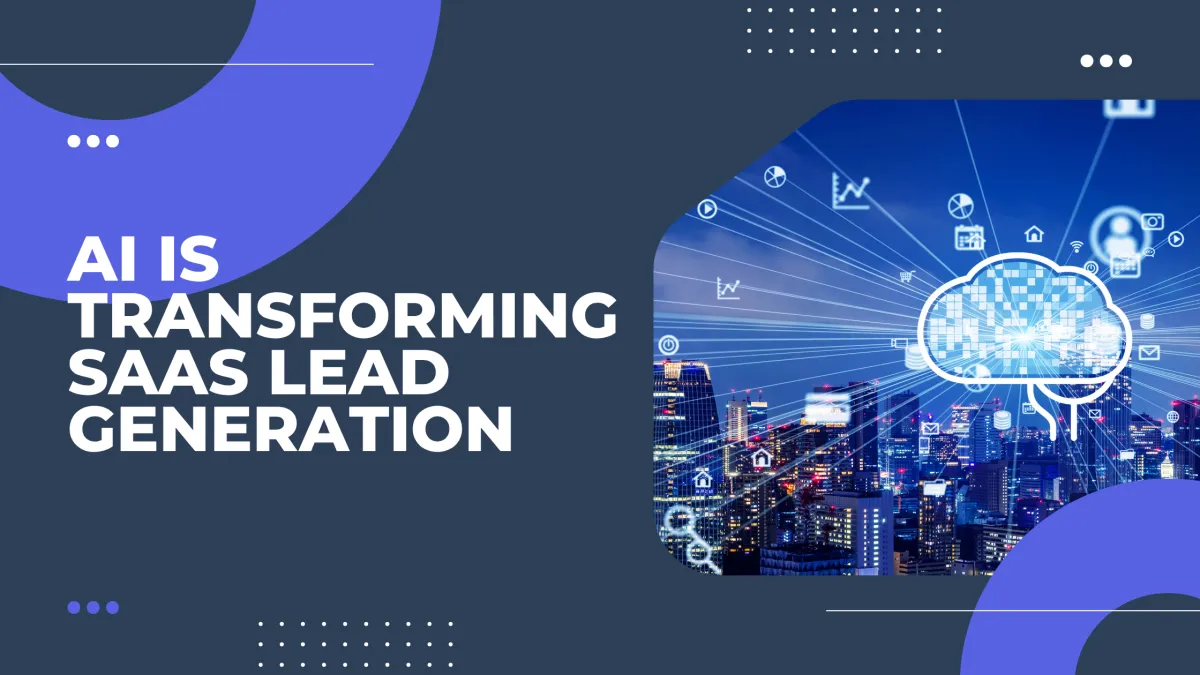
AI is Transforming SaaS Lead Generation
AI is Transforming SaaS Lead Generation
AI is no longer a futuristic concept for SaaS companies—it's happening right now, and the results are impressive. 78% of organizations already use AI in at least one business function, and SaaS companies are seeing dramatic improvements in how they find, engage, and convert customers. If you're running a SaaS business and haven't started using AI for lead generation and customer engagement, you're likely missing out on significant opportunities.
Here's what the latest research from 2024-2025 tells us about AI's impact on SaaS businesses, complete with real numbers, practical tools, and actionable insights you can use today.
The numbers don't lie about AI adoption
The statistics around AI adoption in SaaS are striking. 44% of SaaS companies are actively embedding AI into their current applications, and 95% of senior leaders report their organizations are investing in AI. What's even more compelling is the ROI data: companies using AI effectively are seeing average returns of 5.9%, while high-performing AI companies achieve 13% ROI on their AI investments.
The adoption surge is particularly strong in sales and marketing functions. 74% of marketing professionals currently use AI tools, and 43% of sales professionals have incorporated AI into their daily work. This represents a massive jump from just 24% of salespeople using AI in 2023.
Companies that implement AI automation report cost savings in 44% of deployed business units, and AI high-performers are 4x more likely to see cost decreases of at least 10%. For SaaS businesses specifically, this translates to tangible improvements in customer acquisition costs, sales cycle length, and overall revenue growth.
AI-powered CRM systems are game-changers
The integration of AI into Customer Relationship Management systems is delivering some of the most measurable benefits for SaaS companies. Companies using generative AI in CRM are 83% more likely to exceed sales goals, and users report an average 35% increase in conversion rates.
The efficiency gains are equally impressive. Sales teams save an average of 2 hours per day through AI automation, and AI automation can reduce manual processes by up to 80%. For lead management specifically, AI lead scoring increases accuracy while reducing manual processing time by 80%.
HubSpot's Breeze AI has delivered particularly strong results for their customers. Companies using their AI suite report 25% more engagement and 4x more sales leads. Kaplan achieved a 30% reduction in customer service response times after implementing HubSpot's AI tools.
Salesforce Einstein users are seeing similar benefits. 63% of sales leaders report AI makes it easier to compete with other businesses, and sales professionals using AI for buyer sentiment analysis are 52% more likely to exceed their goals.
The ROI on CRM AI integration is substantial. Data enrichment projects show 6x to 46x ROI depending on implementation quality, and companies typically see 50% reduction in customer acquisition costs through AI-powered personalization programs.
Amplify your AI strategy with intelligent lead discovery
Here's what many SaaS companies miss: your AI-powered CRM is only as good as the data you feed it. You can have the smartest automation and personalization in the world, but if you're working with stale, incomplete lead data, your results will suffer.
This is where AI-powered lead intelligence platforms like White Label Suite become game-changers for SaaS companies. Instead of buying generic lead lists or manually researching prospects, you can find fresh, validated contacts in real-time using advanced search capabilities.
Why this amplifies your existing AI strategy:
Real-time data quality improves AI accuracy. When your AI personalization engines work with current, validated contact information, your campaigns perform dramatically better. Stale data creates poor AI recommendations and hurts your sender reputation.
Better targeting feeds better AI decisions. You can search for companies by specific criteria like technology usage, company size, growth stage, and industry. This precision targeting gives your AI systems the right foundation to build personalized outreach that actually converts.
Seamless integration with your existing tech stack. Instead of managing multiple disconnected tools, you can push discovered leads directly into your CRM where your AI automation takes over. This creates a smooth pipeline from discovery to conversion.
White-label capabilities create new revenue opportunities. For SaaS companies serving other businesses, you can rebrand the entire lead intelligence platform and offer it as your own service. This creates additional recurring revenue while providing real value to your customers.
Automated workflows save your team time. Set up autopilot searches to discover new qualified prospects automatically. Your AI can then nurture these leads with personalized sequences while your sales team focuses on closing deals.
The three-step process works perfectly for SaaS companies:
Search: Find prospects matching your ideal customer profile using people search, company search, or technology-based filters
Set Up: Integrate with your existing CRM and marketing automation tools, plus white-label with your branding if desired
Sell: Let your AI systems take over with personalized outreach and nurturing sequences
The combination of fresh, targeted lead data feeding into sophisticated AI automation creates a powerful growth engine. SaaS companies using this approach report significant improvements in lead quality, conversion rates, and overall sales efficiency.
Personalization at scale drives conversion improvements
AI's ability to personalize interactions at scale is transforming how SaaS companies engage with prospects and customers. AI personalization drives a 35% increase in conversion rates on average, and personalized email campaigns show 25% increase in email open rates and 15% increase in conversion rates.
The impact extends beyond just email marketing. Companies using AI for lead qualification see a 30% increase in qualified leads and 20% reduction in sales cycle time. This is particularly powerful for SaaS businesses where shorter sales cycles directly impact cash flow and growth rates.
66% of sales professionals report AI helps provide personalized experiences and better customer understanding. This personalization capability is becoming a competitive differentiator, with companies using AI personalization being 150% more likely to exceed sales goals when combined with mobile CRM platforms.
Sales automation delivers measurable efficiency gains
The results from sales automation implementations are consistently positive across the industry. 35% of sales professionals report that AI tools save them time and automate manual tasks as the biggest benefit. The time savings break down to 30 minutes to 1 hour on prospect outreach, 1-2 hours on lead qualification, and 1-2 hours on data analysis.
Companies see 32% higher annual revenue growth when they align sales processes with automation, and 14.5% increase in sales productivity is typical with automation tools. The lead generation improvements are even more dramatic: 451% increase in qualified leads for businesses using marketing automation software.
70% of sales professionals using AI for prospect outreach report higher response rates, and 89% of sales professionals leveraging AI to write messages to prospects say it's effective. Response rates to outreach can increase by 45-70% when AI voice agents replace traditional communication methods.
The ROI on marketing automation is compelling: $5.44 return for every $1 spent on marketing automation, with 76% of companies seeing positive ROI within the first year.
AI chatbots are becoming customer service powerhouses
AI chatbots are proving their worth in SaaS customer engagement with impressive performance metrics. 96% of chatbot interactions can be resolved without human support agent intervention when properly optimized, and 75% of customer questions are handled by chatbots without needing human help.
Customer satisfaction with chatbots is surprisingly high. 87.2% of consumers rate their interactions with bots as either neutral or positive, and 62% of respondents prefer engaging with customer service chatbots rather than waiting for human agents. This preference is driving 40% increase in client interactions through automated, personalized chatbot follow-ups.
The cost savings are substantial. Intercom clients saved an average of $300,000 annually in support costs after adding AI chatbots, representing a 30% reduction in customer support costs through chatbot implementation. Response times improve dramatically, with some companies achieving 99.6% reduction in first response time through AI chatbot implementation.
For SaaS companies specifically, 65.1% are using chatbots for lead generation and customer engagement, with many reporting 70% increase in conversion to signup through chatbot interactions.
Successful SaaS companies are using specific AI tools
The most successful SaaS implementations are happening with specific, proven AI platforms. Here are the tools that are delivering the best results:
Wrike achieved a 496% increase in contributed pipeline using Drift conversational AI chatbots, along with a 454% increase in contributed bookings and 15x+ ROI since implementation.
Smartling uses Apollo's AI Power-Ups to generate 10x more personalized outreach emails than manual processes, while Built In saw a 10% increase in win rates and 10% increase in average deal size after implementing Apollo's data enrichment.
Hyperke Media achieved an 80% increase in appointments (from 100-125 to nearly 200 per month) using Smartlead AI for automated email outreach, with 9-10% reply rates for their campaigns.
Other successful tools include:
ZoomInfo Copilot: Users drive 2x the opportunities compared to peers and see email response rate improvements of nearly 90%
HubSpot Breeze: Comprehensive AI suite delivering 25% more engagement and 4x sales leads
Salesforce Einstein: 52% more likely to exceed goals when using AI for buyer sentiment analysis
Implementation challenges have practical solutions
While the benefits of AI are clear, SaaS companies do face technical challenges during implementation. The most common issues include legacy system integration, data quality management, scalability concerns, and security considerations.
70% of popular SaaS apps can train AI models with customer data, creating "Shadow AI" risks that require careful security planning. The solutions involve implementing Zero Trust security architecture, using encryption for data at rest and in transit, and establishing strict data access controls.
For integration challenges, successful companies are using microservices architecture to enable independent scaling of AI components, API-first design to facilitate integration with AI services, and gradual implementation starting with pilot programs before full deployment.
The key is starting small and scaling gradually. Most successful implementations begin with specific use cases like chatbots or basic predictive analytics, then expand based on measurable results.
Looking ahead at AI trends
Several emerging trends will shape AI in SaaS. Gartner predicts that by 2028, 33% of enterprise software applications will include agentic AI, enabling 15% of day-to-day work decisions to be made autonomously.
42% of SaaS vendors are actively working on new AI product innovation in 2024, with focus shifting from experimentation to measurable ROI. The emphasis is moving toward pragmatic AI adoption with clear business value rather than experimental implementations.
Multi-modal AI capabilities are expanding, combining text, image, and voice processing within SaaS applications. Edge computing integration is also growing, allowing for real-time AI inference with reduced latency and improved user experience.
AI versus traditional methods show clear advantages
The comparison between traditional and AI-powered lead generation methods shows significant advantages for AI approaches. AI methods achieve 40% improvement in lead quality and can deliver 451% more lead generation through automation compared to traditional methods.
AI-enhanced sales processes show 40% reduction in time-to-close through predictive analytics and intent data, while traditional methods require 21% of sales rep time for lead research that AI can automate.
The cost analysis favors AI in the long term. While traditional methods have lower upfront technology costs, AI methods deliver lower long-term customer acquisition costs despite higher initial investments. Companies using AI automation achieve 2-3x faster lead conversion through behavioral targeting and real-time scoring.
However, the most successful approach is often hybrid, maintaining traditional methods for high-value enterprise accounts while using AI to enhance rather than replace personal relationship building.
Key industry benchmarks to track
SaaS companies implementing AI should track these industry benchmarks:
Lead Conversion Rates: Website conversion rates of 2-5% are typical for B2B SaaS, with rates exceeding 5% considered excellent. AI personalization typically improves these rates by 35%.
Customer Acquisition Cost: Average CAC for SaaS is $702, with most firms between $200-$600. AI implementations typically reduce CAC by 15-30%.
Sales Cycle Length: Average B2B SaaS sales cycle is 3-6 months, with AI reducing this by 20-40% through better qualification and personalization.
Retention Metrics: Best-in-class SaaS companies maintain 95% customer retention rates, with AI helping achieve net revenue retention of 110-120%.
Practical next steps for SaaS companies
Based on this research, here are actionable steps SaaS companies should take:
Start with pilot programs to test AI effectiveness in specific areas like chatbots or email personalization. Focus on data infrastructure first—ensure you have clean, unified data before implementing AI tools.
Choose proven platforms like HighLevel, HubSpot Breeze, or Salesforce Einstein, that have demonstrated results in SaaS environments. Measure ROI continuously with clear metrics tracking conversion improvements, cost savings, and efficiency gains.
Plan for gradual scaling. Begin with one or two AI tools, measure results, then expand based on proven success. Most companies see positive results within 6-12 months of implementation.
The evidence is overwhelming: AI is not just changing how SaaS companies generate leads and engage customers—it's becoming essential for competitive survival. Companies that embrace AI thoughtfully and systematically are seeing dramatic improvements in efficiency, conversion rates, and profitability. The question isn't whether to implement AI, but how quickly and effectively you can do it.
Copyright 2025 | White Label Suite | Terms & Conditions

Ready to scale your agency? White-label and resell White Label Suite to your clients.
"Use It. Brand It. Sell It."

4.9/5 | 2,500+ happy agencies worldwide
Features
Contact
General Inquiries
Contact Support
Office Hours: 8 am - 6pm EST Monday - Friday





Facebook
Instagram
X
LinkedIn
Youtube